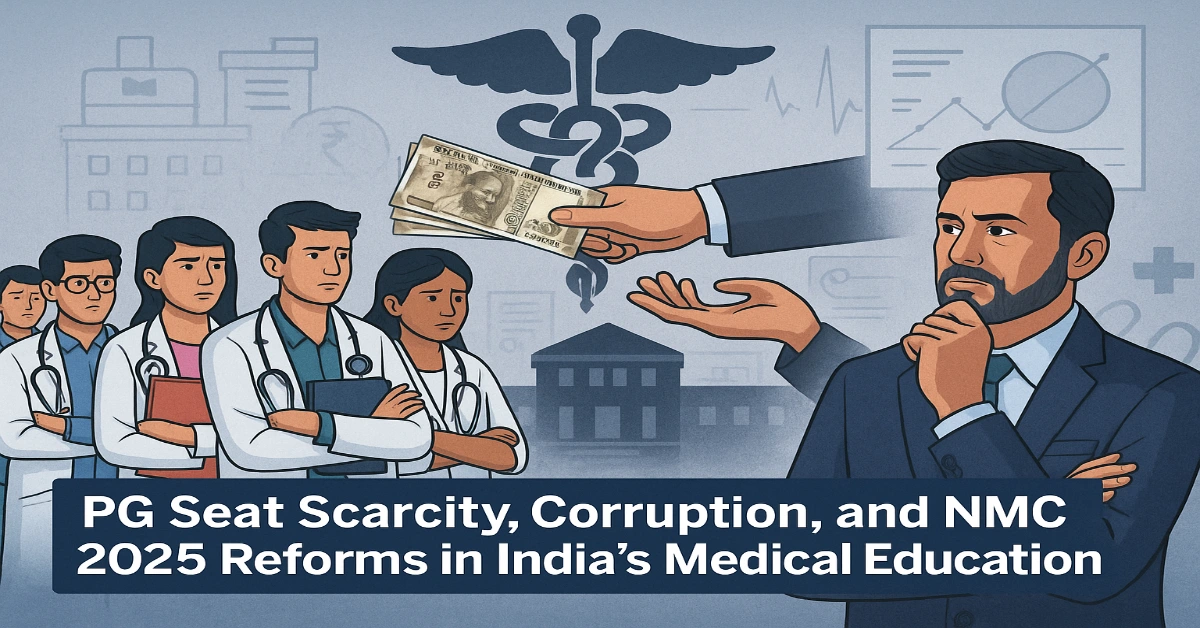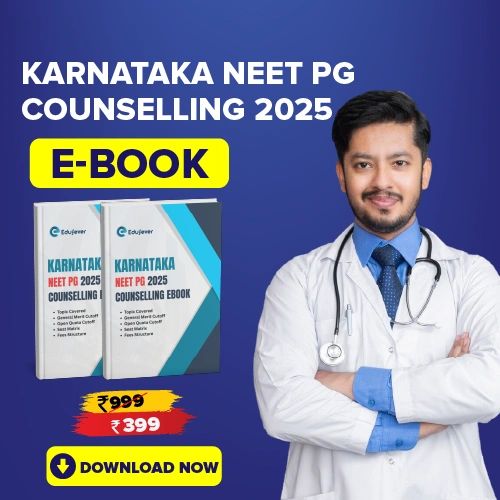India’s medical education system is at a pivotal moment. With over 1.2 lakh MBBS graduates annually and limited postgraduate (PG) seats, competition is fierce. This imbalance fuels unethical practices, including proxy exams, ghost candidates, and donation-based admissions, while simultaneously spawning a booming coaching and test-prep industry.
Recognising these challenges, Dr Abhijat Sheth, Chairman of the National Medical Commission (NMC), has laid out a transformative vision for 2025-26. Speaking at the 86th Foundation Day of IMA Hyderabad, he emphasised that medical education must balance quantity with quality, expand PG opportunities proportionally, and integrate AI-driven learning tools to ensure competency-based training.
This article explores how PG seat scarcity drives corruption, how coaching centers exploit this system, and how the NMC’s reforms aim to create a fairer, modernised medical education ecosystem.
NEET PG Seat Scarcity in India
Despite India producing a large number of MBBS graduates, NEET PG seats have historically lagged, creating a major bottleneck. In 2023, there were approximately 70,645 PG seats for over 1.2 lakh graduates. This gap forces students into high-stakes competition, and in many cases, desperation-driven, unethical practices.
Dr. Sheth’s 2025 proposal addresses this directly:
- Expansion of MBBS seats: 1.23 lakh MBBS seats approved for 2025-26.
- Equitable MBBS-PG ratio: Advocates for a 1:1 ratio between MBBS and PG seats to ensure every graduate has a realistic chance at specialisation.
The lack of proportional PG opportunities previously led to inflated demand for coaching centers and increased incidence of donation-based or proxy admissions. Without this reform, simply increasing MBBS seats could worsen the problem by producing more graduates without avenues for specialisation.
By aligning MBBS and PG seat expansion, the NMC aims to reduce competition-driven corruption, while ensuring India moves closer to the WHO-recommended doctor-patient ratio of 1:1000.
Read Also: Union Cabinet Approves 5000 New PG Medical Seats Under CSS Phase-III
| NEET PG Counselling Guide 2025 | |
|---|---|
| MCC NEET PG Counselling Guide eBook 2025 | 📥 Download |
| DNB Counselling Book 2025 | 📥 Download |
How PG Seat Scarcity Drives Corruption in India
Limited PG seats create incentives for unethical practices:
- Donation-Based PG Admissions: Some private colleges demand large fees for management seats, bypassing merit-based selection. Reports show donations ranging from ₹50 lakh to ₹1 crore in certain institutions.
- Ghost Candidates: Some students secure PG seats but do not attend classes, allowing proxies to benefit. This undermines clinical training and overall educational standards.
- Proxy Exams: Individuals sometimes appear on behalf of others in entrance exams such as NEET PG. A case in 2024 in Rajasthan involved five students detained for proxy appearances, highlighting the systemic nature of the problem.
These practices compromise the integrity and quality of medical education. They also erode public trust in healthcare professionals and increase the risk of underqualified doctors entering patient care.
NMC’s reforms target this directly by proposing:
- Equitable seat expansion, reducing desperation.
- Digital monitoring of admissions and attendance.
- AI-driven evaluation tools to prevent proxy participation.
The Rise of the Coaching & Test-Prep Industry
The scarcity of PG seats has fueled a multi-crore coaching industry. The NEET PG coaching market in India is estimated at USD 110 million, reflecting high demand.
Services offered include:
- Intensive training programs: Designed to crack NEET PG exams.
- Mock exams and personalised mentorship: Often simulating real exam conditions.
- Seat-assurance packages: Some coaching centers offer “guaranteed admission” at extra fees, often facilitated through proxy arrangements or insider contacts.
While coaching can help students prepare effectively, its commercialisation has drawbacks:
- Financial stress on families.
- Ethical grey areas that promote corruption.
- Focus on test-cracking rather than holistic medical training.
Dr Sheth advocates for AI-enabled learning tools, virtual labs, and skill simulations, which can supplement coaching and reduce dependence on commercial coaching centers.
The Proxy Exam and Ghost Candidate Phenomenon
Proxy exams and ghost candidates are byproducts of intense competition for limited PG seats.
How it works:
- A candidate may hire a proxy to appear in the exam.
- Ghost candidates allow others to use their seats in college, often without attending classes.
Impact:
- Compromises clinical competence and patient safety.
- Violates examination protocols.
- Facilitates corruption networks linking coaching centers, middlemen, and college administration.
NMC 2025 interventions:
- Digital attendance tracking.
- AI-assisted exam monitoring.
- Clear legal action against proxies and ghost entries.
These measures aim to ensure merit-based admission and accountability in PG programs.
Implications for Healthcare and Students
Corruption in PG admissions has a direct impact on India’s healthcare ecosystem:
- Deterioration of medical education quality: Unqualified candidates entering PG programs reduce training standards.
- Psychological burden on honest candidates: High fees, coaching pressure, and unethical practices cause stress and disillusionment.
- Public trust erosion: Patients lose confidence when underqualified professionals are in practice.
Dr Sheth’s NMC reforms focus on competency-based education, integrating AI-driven learning, skill labs, and clinical simulations, ensuring students develop practical, hands-on expertise. This approach bridges the gap between theory and practice, improving healthcare delivery in the long term.
NMC 2025 Roadmap: Tackling Corruption and Coaching Exploitation in Medical Education
Several regulatory challenges exacerbate corruption:
- Lack of proportional PG seats to MBBS graduates.
- Weak monitoring of proxy and ghost candidates.
- Coaching-driven corruption due to opaque admission processes.
NMC’s 2025 reforms:
- Equitable MBBS-PG Expansion: Aim for a 1:1 ratio of MBBS to PG seats.
- AI Integration: Virtual learning, skill labs, and clinical simulations to supplement traditional education.
- Digital Admissions & Monitoring: Transparency in seat allocation, attendance, and exam conduct.
- Institutional Responsibility: Competency-based education models with a practical training focus.
- Medical College Rating System: Ensuring quality benchmarks and accountability.
These measures are designed to curb corruption, improve meritocracy, and enhance student competence, while fostering ethical practices across medical education.
The nexus of PG seat scarcity and corruption has long challenged India’s medical education system. Practices such as proxy exams, ghost candidates, and commercial coaching exploitation compromise both education and healthcare quality.
However, NMC’s 2025 vision under Dr Abhijat Sheth offers a roadmap for reform:
- Equitable MBBS-PG seat expansion ensures opportunities for all graduates.
- AI-driven learning and skill labs reduce dependence on coaching while enhancing practical competence.
- Digital monitoring and competency-based education promote transparency, accountability, and meritocracy.
If implemented effectively, these reforms can usher in a new era of medical education in India where quality aligns with quantity, technology complements clinical training, and ethical practices replace corruption-driven shortcuts. For aspiring doctors and patients alike, this represents a critical step toward a fair, competent, and modern healthcare ecosystem.

